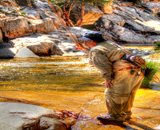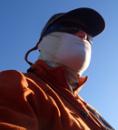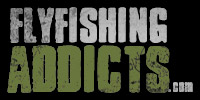This is an article that I found on the Wooly Bugger Company blog site. It could have been written by any number of our members. It has some good thoughts.
Why I Catch More Fish Than YOU Do!” What? Seriously?
By Jason Edwards on May 6, 2014 in Guest Blogs
Now that I got your attention with this title, let’s discuss this idea of catching more fish. It caught my attention on a recent trip that we took, that the so called “fish count” varied among the seven fly fishers. It varied by a lot! Fishing the same waters, on the same day, with even the same flies, I thought to myself why wouldn’t we all be relatively close in the number of fish that we caught. The numbers varied from 25 trout down to two or three per individual. So I decided to address this if I can. Now remember fly fishing is NOT about the amount of fish you catch. The beauty, the river, the colors of the season, friendships, and being immersed in all of God’s glory is what it is all about. But it does make the trip more enjoyable when we do catch some fish – lots of fish. So what is it that makes one guy catch way more fish than another? Maybe these few tips will help you in this area:
Experience: Yes, I hope this is quite obvious. The more you fish the better fly fisher you will become. But what does experience truly mean. Fishing a lot in the same place doesn’t mean that you are an “experienced” fly fisher. If you only go to Montauk State Park but never outside of the park or to Tan Vat or Baptist camp or Lake Taneycomo, or Bennett (all Missouri locations), or just Colorado, or just Wyoming, you will never truly test your skills. So to be truly a good fly fisher you must fish frequently but also fish in many different locations.
Knowledge: Know your sport! Study your sport! Read books, magazines and go online to gather as much information you can about the sport of fly fishing. Seek help from the guy who you feel is a good fly fisher or from the guy that is fishing well that day. Ask questions when on the river and observe the guy that is doing well. Fly fishing is not putting a worm on a hook and waiting for a fish to come, but rather it is finding the fish, figuring out what the fish may be eating and presenting it to the fish. Fly fishing is a thinking man’s sport so put on your knowledge cap and attack.
Technique: Now we are getting into an area that takes a combination of the first two tips and puts them into action. I love when I hear some of our guys say, “I am really going to practice a better mend today or I am going to work on my dry fly technique.” It shows me that they are willing to improve rather than do the same thing over and over again – like throw that woolly bugger and strip, strip, strip… I have noticed that a majority of our guys still have a terrible dead drift technique. When fishing midges, nymphs, and even dry flies this could be make the difference. Many of you have a dead drift that maybe lasts 20 feet – not very effective if you what to catch fish. The guys that went out to the San Juan River in New Mexico found out how important doing this technique properly was. Make that indicator lead the fly line downstream, kick out your fly line for a long drift and concentrate on that indicator. Another area where we don’t do well is knowing when the indicator is telling us that we have a fish on. Anyone knows that they have a strike when the indicator disappears but we need to understand that when that indicator twitches, stops its flow downstream or even slows down from the natural flow of the current, it very well can mean fish on. If you miss that then you just missed a fish. When dry fly fishing we need to stop slapping the water with our fly line and make that fly gently fall to the water. There are a lot more techniques that we can improve on. So next time on the water, ask someone to critique your technique and work on it.
Equipment: No, I don’t mean you must have a $700 rod and a $300 reel. Remember in class I said how important the “end” of the fly line is when fishing. Are you making sure that your leader is long enough? Have you added any tippet since you changed flies six or seven times? Does your tippet size match your fly size (remember the power of three – using a size 18 fly you should be using at least size 6x tippet)? I have seen a few of you start the day with a nice 9 ft leader and at the end of the day it is four feet. What’s that all about? Are you using the correct size fly? Color? There are many things to think about so don’t put them in the back of your mind and just tie on any fly. Know why you are using each fly that you tie on.
The Feel: Sorry guys this is something that can’t be taught. Some guys have the feel (BAM) and some don’t. Oh, that doesn’t mean if you don’t have it you never will – you just have to work on it. I find that once you feel something a few times, like setting the hook when the indicator barely slows down and catching a fish, you will put that in your memory bank and the “catching” will increase. You know when you hear some of the guys on the river saying, “Boy, they sure are hitting very subtle right now”. And you say to yourself, “What the heck are they talking about?” That’s “The Feel!” To be able to catch that fish when they are barely taking your fly is part of having the feel. To know where to place your fly to put it into position to catch the fish is part of having the feel. Again, it can’t be taught but all of the above tips make it possible to get there.
Luck: Luck has nothing to do with it! OH, OK, once in a while a guy that doesn’t catch many fish hits it big on a day or two. Or someone puts on a wild fly combination and does well. But to be consistently good at fly fishing you must do the things above. So next time you are out on the water with me and want a critique or suggestion on what or how to improve your fly fishing skill I would be more than willing to help – Always! So don’t be shy or think you are bothering me. If I am not on the trip ask one of the other guys to “critique” you and ask how they feel that you can improve. When I am around guides or others that are good fly fishers I always take the time to watch, ask and listen. If you have any comments please email me!!
REALTIME FLOWS  U. Kern: n/a cfs
U. Kern: n/a cfs
 L. Kern: 1341 cfs
L. Kern: 1341 cfs
 E.W: 312 cfs
E.W: 312 cfs
 U. Owens: 108 cfs
U. Owens: 108 cfs  L. Owens: 496 cfs 09/02/19 1:15 PM PST
L. Owens: 496 cfs 09/02/19 1:15 PM PST
Great Read!
3 posts
• Page 1 of 1
Great Read!
"Tomorrow is the most important thing in life. Comes into us at midnight very clean. It's perfect when it arrives and it puts itself in our hands. It hopes we've learnt something from yesterday."
John Wayne
John Wayne
-

Wildman - Site Admin
- Posts: 3747
- Joined: August 17th, 2008, 2:07 pm
Re: Great Read!
I'd like to add a few things.....
Concentration
If you can stay in the moment and concentrate on what you are doing all the time, you will improve your results.
Patience while fishing and the difference between knowing it's time to change flys, presentations, or locations.
Polarized sunglasses and a hat.
If you can't see them you will miss some easy opportunities and end up walking right through fish.
It will also help you when fighting fish because you can see what they are doing.
A landing net, wading staff, a good * set of wading boots.
Stealth
This comes in many varieties.
The ability to wade both through the water and on the bank in such a way that it will not spook the fish you mean to catch. If you can get close enough without spooking the fish you can cast with more precision.
The clothing you wear and even sometimes the color of your flyline can make a difference.
The Cast
The ability to make many different casts for different situations accurately. Upstream, downstream, across, down and across, up and across, slack line, steeple, parachute, roll, tuck, can you shoot line? can you put mends in your line while still in the air to compensate for current seams?.....
Can you drop your fly onto a dessert plate at 40', 50', 60', 80'? What about to that riser just 15' away on the first cast? How about with a quartering wind over your casting shoulder? in your face? from behind?
Knowing how to fight a fish
Well you finally got one on, now will you be able to land him? There's a lot to know especially when fighting big fish in heavy currents. Perpendicular pressure, down and dirty, keeping the fish upstream from you, how to bring them to net quickly, so much here will make a big difference.....
Do you research your quarry?
Do you understand it's habits? Life cycles? Reproduction? It's biological needs? What it favors for it's meals?
How that changes during the year? There is so much to know you can never stop learning and improving here.
Eventually you'll think like a fish.
By the way I haven't mastered everything myself and I don't think I ever will, I'm no "GOAT" (Greatest of all Time)
That would also imply there's nothing left to learn, no more surprises or revelations, and they are fun.
And I am a big believer in Luck !
Preparation and technique meets opportunity.....
Jimbo
Concentration
If you can stay in the moment and concentrate on what you are doing all the time, you will improve your results.
Patience while fishing and the difference between knowing it's time to change flys, presentations, or locations.
Polarized sunglasses and a hat.
If you can't see them you will miss some easy opportunities and end up walking right through fish.
It will also help you when fighting fish because you can see what they are doing.
A landing net, wading staff, a good * set of wading boots.
Stealth
This comes in many varieties.
The ability to wade both through the water and on the bank in such a way that it will not spook the fish you mean to catch. If you can get close enough without spooking the fish you can cast with more precision.
The clothing you wear and even sometimes the color of your flyline can make a difference.
The Cast
The ability to make many different casts for different situations accurately. Upstream, downstream, across, down and across, up and across, slack line, steeple, parachute, roll, tuck, can you shoot line? can you put mends in your line while still in the air to compensate for current seams?.....
Can you drop your fly onto a dessert plate at 40', 50', 60', 80'? What about to that riser just 15' away on the first cast? How about with a quartering wind over your casting shoulder? in your face? from behind?
Knowing how to fight a fish
Well you finally got one on, now will you be able to land him? There's a lot to know especially when fighting big fish in heavy currents. Perpendicular pressure, down and dirty, keeping the fish upstream from you, how to bring them to net quickly, so much here will make a big difference.....
Do you research your quarry?
Do you understand it's habits? Life cycles? Reproduction? It's biological needs? What it favors for it's meals?
How that changes during the year? There is so much to know you can never stop learning and improving here.
Eventually you'll think like a fish.
By the way I haven't mastered everything myself and I don't think I ever will, I'm no "GOAT" (Greatest of all Time)
That would also imply there's nothing left to learn, no more surprises or revelations, and they are fun.
And I am a big believer in Luck !
Preparation and technique meets opportunity.....
Jimbo
- Jimbo Roberts
- Posts: 1329
- Joined: October 19th, 2011, 7:47 pm
- Location: San Antonio Texas
Re: Great Read!
And attitude. I've been on the water and had less than stellar outings compared with other guys I'm with. The second guessing and angst kicks it. When that happens, I usually get off the water, have a beer, and appreciate the surroundings. Once back in the water, I start catching fish. Their pity and my positive attitude seemed to work.
"We're a cross between our parents and hippies in a tent...."
180 Degrees South
180 Degrees South
-

WanderingBlues - Posts: 5299
- Joined: December 2nd, 2009, 10:49 am
- Location: Living in a Tin Can

